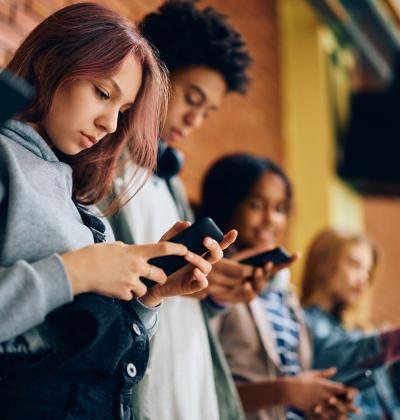Workshops to Support Media Literacy & Digital Wellbeing
EDC’s Digital Wellbeing Professional Development offers high-quality, adult learning-centered workshops that help schools and districts address the opportunities and challenges students face growing up in a digital world.
Our Approach
From TikTok trends to AI-powered tools, today’s digital world is reshaping how students learn, connect, and cope. While these technologies open new doors, they also raise concerns about student learning, mental health, cyberbullying, and academic integrity.
EDC equips schools and districts with strategies to promote balanced, healthy digital engagement that supports academic success, fosters social connection, strengthens emotional growth, and addresses the mental health challenges linked to media use—helping educators create safe, supportive learning environments where all students can thrive.
Each two-hour online workshop is designed for up to 50 participants. Workshops include interactive learning, discussion, and reflection and instructional resources such as videos. Action planning activities serve as opportunities to practice and apply concrete strategies.
Schools and districts may work with EDC to host a single workshop or a package of six standalone workshops scheduled at your convenience. Single workshops are priced at $5,000 and a package of six workshops is priced at $20,000.
Selected Topics
Our team will help you select the best workshop or combination of workshops and contextualize them to meet your district priorities and goals.
- Building a Cohesive Digital Wellbeing Framework with MTSS
-
Leaders explore how to use a whole-school approach to Multi-Tiered System of Support (MTSS) to promote digital wellbeing. They learn how to integrate strategies into existing structures, align policies on the use of digital and AI-powered tools, and address diverse student needs. Leaders leave with actionable steps to create a sustainable framework for healthy digital engagement.
- Tier 1 Classroom Strategies for Digital Wellbeing
-
In this workshop, teachers are prepared to promote digital wellbeing during health classes, advisories, and other student support settings. Teachers learn Tier 1 strategies to help all students manage screen time, engage responsibly online, and balance digital and in-person interactions. The workshop emphasizes safe, supportive spaces where students can reflect on their digital lives and practice skills for positive wellbeing.
- Integrating Media Literacy Across the Curriculum
-
Educators across content areas are guided in how to harness media literacy instructional practices for their curriculum, helping students learn how media shapes their worldview. The workshop offers practical ways to unpack the social and cultural implications of media, including AI, across subjects from math and science to social studies, language arts, and health, empowering students to make informed choices.
- Supporting Student Voice and Wellbeing in The Classroom
-
Research shows that promoting student voice—the ability to think critically, speak and act with conviction, and advocate for personal and communal needs—increases engagement, confidence, and wellbeing. Drawing on decades of work with inquiry-based learning and youth media making, this workshop helps educators create opportunities to promote student voice while advancing instructional goals.
- Media Literacy in Support of Civic Education Projects
-
With civics increasingly mandated across K-12 education, educators need high-quality resources to enrich civic instruction in a media-saturated world. Media literacy is foundational for robust civic education, equipping students with skills around critical thinking, analysis, and media creation to make informed decisions and take action in their communities.
- Learning & the Media Landscape
-
As new polices restrict students’ phones and personal devices, educators have an opportunity to examine media experiences and their impact on learning. Drawing on current research, this workshop focuses on how media shapes students’ understanding, perspectives, and wellbeing, revealing how media literacy practices can mitigate negative influences while empowering healthy choices and creative expression.
